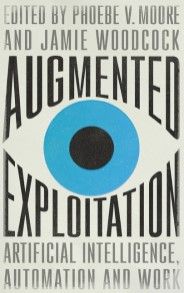Augmented Exploitation: Artificial Intelligence, Automation and Work

Edited by Phoebe V. Moore and Jamie Woodcock
Artificial Intelligence is a seemingly neutral technology, but it is increasingly used to manage workforces and make decisions to hire and fire employees. Its proliferation in the workplace gives the impression of a fairer, more efficient system of management. A machine can't discriminate, after all.
Augmented Exploitation explores the reality of the impact of AI on workers' lives. While the consensus is that AI is a completely new way of managing a workplace, the authors show that, on the contrary, AI is used as most technologies are used under capitalism: as a smokescreen that hides the deep exploitation of workers.
Going beyond platform work and the gig economy, the authors explore emerging forms of algorithmic governance and AI-augmented apps that have been developed to utilise innovative ways to collect data about workers and consumers, as well as to keep wages and worker representation under control. They also show that workers are not taking this lying down, providing case studies of new and exciting form of resistance that are springing up across the globe.
Available from Pluto Press.
Endorsements
Brings together a range of unmissable views across the contemporary spectrum of technology-driven labour relations - Dr. Ivan Williams Jimenez, Policy and Development Manager at the Institution of Occupational Safety and Health, UK
A path-breaking book offering unparalleled insights. Moore and Woodcock re-affirm their position as leaders in this field - Premilla D'Cruz, Professor of Organizational Behaviour Area, Indian Institute of Management Ahmedabad (IIMA)
Translations
Translation into Chinese Simplified Character (forthcoming).
Reviews
- Morning Star
- We Make Money Not Art, by Régine Debatty
Contents of the Book
Introduction
Part I: Making It
1. ‘The Mirror for (Artificial) Intelligence: Working in Whose Reflection?’ - Phoebe V Moore (University of Leicester)
2. ‘It Gets Better with Age: AI and the Labour Process in 'Old' and 'New' Gig-Economy Firms’ - Adam Badger (University of Oxford)
3. ‘A Sense of Autonomy in the Algorithmic Panopticon’ - Benjamin Herr (University of Vienna)
4. ‘AI, Routine Work and Skilled Jobs’ - Craig Holmes (University of Oxford)
5. ‘The Power of Prediction: People Analytics at Work’ - Uwe Vormbusch (Environment Agency) and Peter Kels (Lucerne University of Applied Science and Art)
6. ‘Manufacturing Consent in the Gig Economy’ - Luca Perrig (University of Geneva)
Part II: Faking It
7. ‘Putting the Habitus to Work: Digital Prosumption, Surveillance and Distinction’ - Eduard Muller (University for International Cooperation)
8. ‘Automated and Autonomous? Technology as Mediator in Labour Subjectivation’ - Beatriz Casas González
9. ‘The Banking Labour Process: Contradictions Among Automation, New Mechanisms of Control and the Construction of Customer Confidence’ - Giorgio Boccardo (University of Chile)
Part III: Breaking It
10. ‘Work Now, Profit Later: AI between Production and Finance’ - Toni Prug (Queen Mary, University of London) and Paško Bilić (Institute for Development and International Relations, Croatia)
11. ‘’Room to move': Self-quantification, sousveillance & the shared curation of data’ - Frederick Harry Pitts (Unviersity of Bristol)
12. ‘Breaking Digital Atomisation: Resistant Cultures of Solidarity in Platform-Based Courier Work’ - Heiner Heiland (Technical University Darmstadt) and Simon Schaupp (University of Basel)
13. ‘Resisting the Algorithmic Boss: Guessing, Gaming, Reframing and Contesting Rules in App-Based Management’ - Joanna Bronowicka (European University Vadrina, Frankfurt) and Mirela Ivanova (University of Oxford)
Conclusion